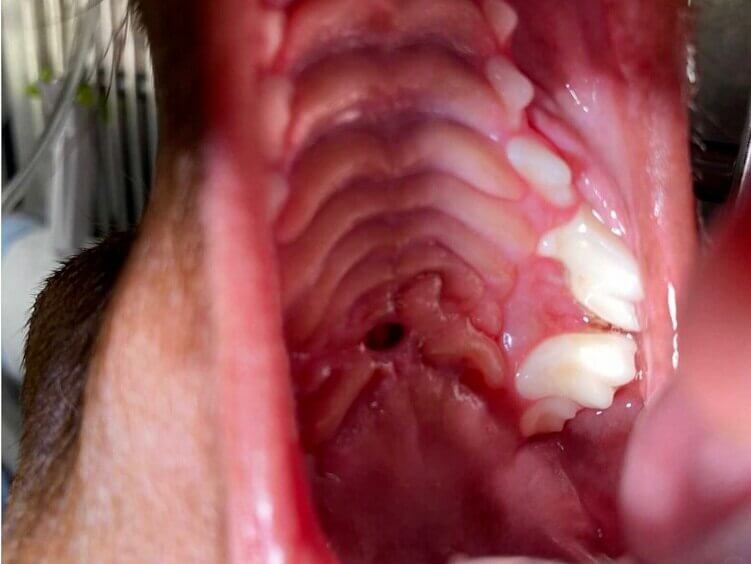To answer the question of whether or not dogs have adenoids, it is important to first understand what adenoids are and their function in the body.
Adenoids, also known as pharyngeal tonsils, are a cluster of lymphatic tissue located in the back of the nasal passage behind the nose and roof of the mouth.
They are an important part of the immune system and help to filter out bacteria and viruses that enter the body through the nose.
However, the adenoids can sometimes become enlarged, which can lead to difficulty breathing and sleeping.
In some cases, surgery may be necessary to remove the adenoids.
Do Dogs Have Adenoids?
Adenoids are present in humans and some other mammals, including dogs.
However, the adenoid tissue in dogs is much smaller and less developed because dogs have a simpler respiratory system.
As such, dogs are less susceptible to upper respiratory infections than humans and most pet parents will not have to deal with adenoid issues in their dogs.
In fact, enlarged or infected adenoids are more commonly seen in cats than dogs.
In rare cases where adenoid issues do arise in dogs, they may present with symptoms such as snoring, reverse sneezing, gagging, and difficulty breathing.
Even though enlarged adenoids is rare in dogs, it can still happen.
One possible reason for adenoid enlargement in dogs is the presence of an underlying infection, such as a respiratory infection or dental disease.
Such infections can lead to inflammation and swelling of the adenoid tissue.
Another potential cause could be allergies, which can lead to inflammation and enlargement of the adenoids.
As a pet parent, be sure to reduce the exposure of your furry baby to allergens to prevent adenoid enlargement.
Additionally, some breeds may be predisposed to enlarged adenoids due to genetic factors.
For instance, bulldogs and pugs are known to have smaller nasal passages which can potentially lead to adenoid enlargement.
Dogs that have flat faces, also known as brachycephalic breeds, are more prone to respiratory issues and are therefore more susceptible to enlarged adenoids.
It is important to note that enlarged adenoids can also be a symptom of more serious underlying conditions such as cancer.
As such, it is crucial to seek veterinary care if your dog is showing signs of enlarged adenoids.
You may also want to check:
Treatment Options for Enlarged Adenoids

The most common treatment option for enlarged adenoids is surgical removal, also known as adenoidectomy.
This procedure involves removing the adenoids through a small incision in the mouth or nose.
Even though it is intrusive, the procedure is safe and it can improve breathing and reduce chronic respiratory infections for your furry baby.
Another option is medical management, which may include antibiotics to treat any infections and anti-inflammatory medication to reduce swelling and discomfort.
Steroids may also be used to reduce inflammation and improve breathing.
In some cases, a veterinarian may also recommend dietary changes or supplements to support immune health and prevent recurrent issues with enlarged adenoids.
As with any other medical issue, it is important to consult with a veterinarian to determine the best treatment plan for your dog, as each case may vary based on the underlying cause of the enlarged adenoids and any potential risks or complications.
What Happens If Enlarged Adenoids Are Not Removed?

If enlarged adenoids are not removed, your dog may experience a range of health issues including difficulty breathing, chronic ear infections, and recurrent upper respiratory infections.
In some cases, the adenoids can become so enlarged that they block the airway and restrict airflow to the lungs, leading to life-threatening complications.
Additionally, untreated adenoid enlargement can also lead to dental problems such as misalignment of the teeth and jaw due to restricted airflow during development.
This is especially true for younger dogs who are still growing and developing.
Overall, it is important to seek veterinary care if you suspect your dog may have enlarged adenoids to prevent potential complications.
Contrary to what some people think, removing enlarged adenoids is not just for stopping your dog from snoring—the procedure will also improve your dog’s quality of life and may even save his life in some cases.
Can Enlarged Adenoids Affect Your Dog’s Behavior?
Enlarged adenoids can affect a dog’s behavior in several ways.
When the adenoids become swollen, they can block the nasal passages and make it difficult for a dog to breathe.
This can lead to behavioral changes such as lethargy or irritability due to discomfort and inadequate oxygen intake.
In severe cases, enlarged adenoids can also cause sinus infections or sleep apnea, further impacting a dog’s behavior.
In addition, enlarged adenoids can also affect a dog’s sense of smell.
Dogs heavily rely on their sense of smell for communication and navigation.
A decrease in their ability to smell can lead to confusion and disorientation, potentially causing changes in behavior.
By and large, enlarged adenoid is a disease and you cannot expect a sick dog to continue with his normal life as if nothing is wrong.
That’s why this condition should be treated as soon as possible.
Can Adenoids Grow Back After Removal?

It is extremely rare for adenoids to grow back after removal but it could happen.
One potential reason for re-growth could be the incomplete removal of all adenoid tissue during surgery.
In these cases, proper follow-up care and monitoring by a veterinarian may be necessary to ensure that any remaining or regrown tissue does not cause problems for the dog.
Another possible explanation for adenoid regrowth is due to inflammation or infection in the upper respiratory tract, causing an increase in adenoid tissue.
In these instances, addressing and treating the underlying issue may help prevent adenoid regrowth.
In any case, consultations with a trusted veterinarian should always be sought before the removal of adenoids or if you suspect that they are growing back.
Final Thoughts
To summarize, yes, dogs do have adenoids.
And like most mammals with adenoids, adenoid issues like enlargements can occur in dogs as well.
Enlarged adenoids can cause a range of health problems and may even affect a dog’s behavior.
For this reason, it is important to seek veterinary care if your dog is showing symptoms or if enlarged adenoids are suspected.
While adenoid removal is not always necessary, the procedure can greatly improve your dog’s quality of life and prevent potential complications.
Also, there is no guarantee that they won’t regrow even after removal.
That is why it is recommended to consult with a good vet to make sure proper treatment and management is done not only to take care of the problem but also to prevent its recurrence.
As an Amazon Associate, we may receive a small commission from qualifying purchases but at no extra cost to you. Learn more. Amazon and the Amazon logo are trademarks of Amazon.com, Inc, or its affiliates.

